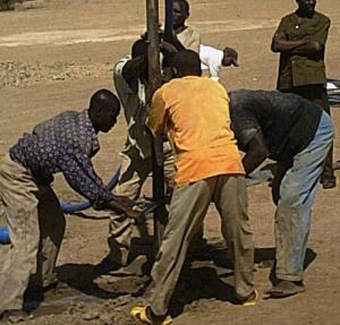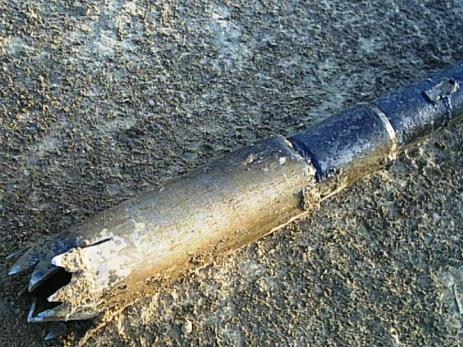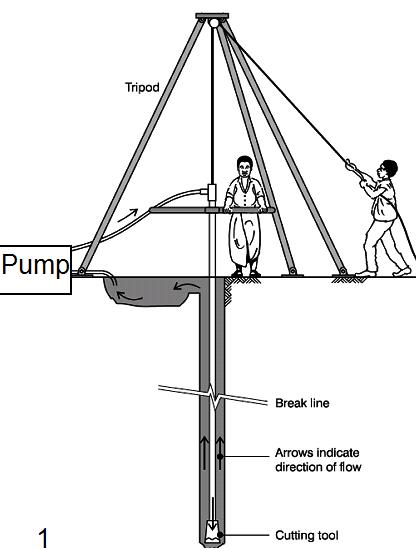Difference between revisions of "Jetting - general"
| (29 intermediate revisions by the same user not shown) | |||
| Line 1: | Line 1: | ||
| − | {{ | + | {{Language-box|english_link= Jetting - general | french_link= Coming soon | spanish_link= Coming soon | hindi_link= Coming soon | malayalam_link= Coming soon | tamil_link= Coming soon | korean_link= Coming soon | chinese_link=水力喷射 — 综述 | indonesian_link= Coming soon | japanese_link= Coming soon }} |
| − | + | [[Image:Jetting icon.png|right|80px]] | |
| − | + | __NOTOC__ | |
| − | [[Image: | + | Jetting is based on water circulation and water pressure. As opposed to sludging, water is pumped down the drill pipe and the ‘slurry’ (water and cuttings) is transported up the borehole between the drill pipe and the borehole wall. A motor pump is used to achieve an adequate water flow. The drill pipe may simply have an open end, or a drill bit can be added. Partial or full rotation of the drill pipe can be used. Thickeners (additives) can be added to the water in order to prevent hole collapse and reduce loss of working water (drill fluid). |
| − | __NOTOC__ | ||
| − | Jetting is | ||
Jetting is practiced in a wide range of varieties. The most simple consists of driving a plastic pipe down with water pressure from a motor pump (no drill bit and no rotation, with the water flow jetting the sand up). The depth is limited (no drill bit and extendable pipes). Other systems make use of extendable plastic or galvanized pipes and a drill bit and are rotated during drilling. With these systems greater depth can be reached. | Jetting is practiced in a wide range of varieties. The most simple consists of driving a plastic pipe down with water pressure from a motor pump (no drill bit and no rotation, with the water flow jetting the sand up). The depth is limited (no drill bit and extendable pipes). Other systems make use of extendable plastic or galvanized pipes and a drill bit and are rotated during drilling. With these systems greater depth can be reached. | ||
| − | ==Suitable conditions == | + | ===Suitable conditions=== |
| + | [[Image:Manually rotated jetting.jpg|thumb|right|200px|Manually rotated jetting]] | ||
| + | [[Image:Typical drill bit.jpg|thumb|right|200px|Typical drill bit]] | ||
| + | |||
Suitable for weakly cohesive sands and silts. Manual jetting is generally used up to depths of 35 meters. | Suitable for weakly cohesive sands and silts. Manual jetting is generally used up to depths of 35 meters. | ||
| − | { | + | |
| − | - Very quick in fine and medium sand formations.<br> | + | {| border="1" cellpadding="5" cellspacing="0" align="center" |
| − | | | + | |- |
| − | - Generally limited to sandy soils. Soft clay will be penetrated only very slowly and coarse gravel and other highly permeable materials (cracks in the formation) cause loss of working water and cannot be drilled. The borehole stays open by water pressure. To prevent collapsing fluid-drilled boreholes must be kept full of water during the entire drilling and well installation process.<br> | + | ! width="50%" style="background:#efefef;" | Advantages |
| + | ! style="background:#f0f8ff;" | Disadvantages | ||
| + | |- | ||
| + | | valign="top" | - Very quick in fine and medium sand formations.<br> | ||
| + | | valign="top" | - Generally limited to sandy soils. Soft clay will be penetrated only very slowly and coarse gravel and other highly permeable materials (cracks in the formation) cause loss of working water and cannot be drilled. The borehole stays open by water pressure. To prevent collapsing fluid-drilled boreholes must be kept full of water during the entire drilling and well installation process.<br> | ||
- A large amount of working water needs to be available on the drilling location (several 200 liter drums/hour). The drilling and well installation needs to be done on the same day. Leaving the borehole open during the night has a high risk of collapsing.<br> | - A large amount of working water needs to be available on the drilling location (several 200 liter drums/hour). The drilling and well installation needs to be done on the same day. Leaving the borehole open during the night has a high risk of collapsing.<br> | ||
| − | - The use of large quantities of water, the use of drilling fluids to greater depths and a motor pump make the equipment cost relatively high. | + | - The use of large quantities of water, the use of drilling fluids to greater depths and a motor pump make the equipment cost relatively high. <br> |
| − | + | |} | |
| − | ==Construction, operations and maintenance== | + | ===Construction, operations and maintenance=== |
| − | [[Image:Jetting.jpg|thumb|right| | + | [[Image:Jetting.jpg|thumb|right|200px|Jetting. Credit: WEDC.]] |
All drilling equipment, except the motor pump and some valves, is locally produced. | All drilling equipment, except the motor pump and some valves, is locally produced. | ||
| − | = | + | ===Field experiences=== |
| − | |||
| − | ==Field experiences== | ||
Jetting is mainly used in Niger, Chad, Madagascar, Nigeria, Senegal, Burkina Faso, Uganda, Kenya, Soudan, Benin, Sri Lanka and western countries. | Jetting is mainly used in Niger, Chad, Madagascar, Nigeria, Senegal, Burkina Faso, Uganda, Kenya, Soudan, Benin, Sri Lanka and western countries. | ||
| − | == | + | ===Manuals, videos and links=== |
| − | * | + | * [http://www.unicef.org/malawi/MLW_resources_qualityassureboreholes.pdf CONSULTANCY SERVICES: QUALITY ASSURANCE OF UNICEF DRILLING PROGRAMES FOR BOREHOLES IN MALAWI] UNICEF, 2011. |
| − | |||
| − | |||
| − | |||
| − | |||
| − | * | + | * Robert Vuik, [http://www.practica.org/wp-content/uploads/services/publications/drilling%20manuals/EN/Jetting%20manual%20drilling%20PRACTICA%20EN.pdf Jetting: Manual Drilling Series, TECHNICAL TRAINING HANDBOOK ON AFFORDABLE MANUAL WELL DRILLING]. Practica Foundation, June 2010. French version: [http://www.practica.org/wp-content/uploads/services/publications/drilling%20manuals/FR/Jetting%20manual%20drilling%20PRACTICA%20FR.pdf FORAGE AU LANCAGE A L’EAU]. |
| − | * | + | * [http://www.lifewater.ca/resources.htm Lifewater Resources] on hydrogeology, well construction, all drilling techniques, hand pumps and more. Lifewater Canada, update 2004. |
| − | * | + | * [http://www.wellspringafrica.org Manuals] on Percussion drilling, well construction, manufacturing tools. Cliff Missen, Wellspring Africa, draft 4. |
| − | * | + | * [http://ghanawashproject.org/wp-content/uploads/2012/07/36_Conference_Paper_Manual-Drilling_Ghana_Naugle-1.pdf Professionalization of Manual Drilling in Ghana.] Ghana WASH Project, Ghana. |
| − | * | + | * [http://docs.watsan.net/Scanned_PDF_Files/Class_Code_2_Water/212.5-79WE-7794-1.pdf Wells Construction: Hand dug and Hand drilled.] Richard Brush, Peace Corps 1980. |
| − | * | + | * [http://www.fao.org/docrep/X5567E/x5567e00.HTM Self-help wells.] R.G. Koegel, FAO 1985. |
| − | * | + | * [http://www.worldcat.org/title/shallow-wells/oclc/008463099 Shallow Wells.] DHV Consulting Engineers, 1978. |
| − | * | + | * [http://www.watersanitationhygiene.org/References/EH_KEY_REFERENCES/WATER/Drilling/Hand%20Drilled%20Boreholes/Human%20Powered%20Drilling%20%28Cranfield%20University%29.pdf Human-Powered Drilling Technologies.] Richard Carter, Cranfield University, 2005. |
| − | * | + | * [http://www.rural-water-supply.net/en/resources/details/148 Drilling Boreholes for Hand pumps.] Peter Wurzel, SKAT Switzerland, 2001 - A book on hydrogeology, well construction, drilling techniques, well development. |
| − | * | + | * [http://www.fao.org/docrep/w7314e/w7314e0v.htm Low-cost shallow tube well construction in West Africa.] M. Sonau, FAO - An overview of shallow tube well drilling techniques. |
| − | * | + | * [http://www.lboro.ac.uk/well/resources/technical-briefs/43-simple-drilling-methods.pdf Technical note 43. Simple drilling methods.] Bob Elson and Rod Shaw, WEDC. |
| − | * | + | * [http://www.unicef.org/wash/files/Wat_e.pdf A Water Handbook, Technical Guidelines Series.] UNICEF, 1999 - Programming and implementation. |
| − | * | + | * [http://www.wateraid.org/documents/plugin_documents/technology_notes_2011.pdf Technology notes, section 7; Tube wells and boreholes.] WaterAid - An overview of human-powered drilling technologies. |
| − | * | + | * [http://www.lifewater.org/resources/rws2/rws2d3.pdf Water for the World, Technical note series rws 2: Designing Jetted Wells.] USAID 1982 - Developing groundwater and manual drilling techniques. |
| − | * | + | * [http://www.enterpriseworks.org/display.cfm?id=5&sub=23&cont=60 Understanding low-cost Well Drilling.] Stephen Greenwood, Technical paper 61, VITA - Manuals on well-drilling. |
| − | * | + | * Lots of articles on [http://www.rural-water-supply.net/en/implementation/manual-drilling/well-jetting-washboring-or-hand-turning Jetting.] Rural Water Supply Network. |
| − | * PAT-Drill - Engine powered drilling equipment and small machines | + | * [http://www.pat-drill.com PAT-Drill] - Engine powered drilling equipment and small machines. |
| − | * Lone Star Bit - Engine powered drilling equipment and small machines | + | * [http://www.lonestarbit.com Lone Star Bit] - Engine powered drilling equipment and small machines. |
| − | * Deep Rock - Engine powered drilling equipment and small machines | + | * [http://www.deeprock.com Deep Rock] - Engine powered drilling equipment and small machines. |
| − | * Drillingfab - Engine powered drilling equipment and small machines | + | * [http://www.drillingfab.com Drillingfab.] - Engine powered drilling equipment and small machines. |
| − | ==Acknowledgements== | + | ===Acknowledgements=== |
| + | * [http://www.lboro.ac.uk/well/resources/technical-briefs/43-simple-drilling-methods.pdf 43. Simple drilling methods.] WEDC. | ||
Latest revision as of 02:09, 24 October 2015
| |
|
|
|
|
|
|
|
|
Jetting is based on water circulation and water pressure. As opposed to sludging, water is pumped down the drill pipe and the ‘slurry’ (water and cuttings) is transported up the borehole between the drill pipe and the borehole wall. A motor pump is used to achieve an adequate water flow. The drill pipe may simply have an open end, or a drill bit can be added. Partial or full rotation of the drill pipe can be used. Thickeners (additives) can be added to the water in order to prevent hole collapse and reduce loss of working water (drill fluid).
Jetting is practiced in a wide range of varieties. The most simple consists of driving a plastic pipe down with water pressure from a motor pump (no drill bit and no rotation, with the water flow jetting the sand up). The depth is limited (no drill bit and extendable pipes). Other systems make use of extendable plastic or galvanized pipes and a drill bit and are rotated during drilling. With these systems greater depth can be reached.
Suitable conditions
Suitable for weakly cohesive sands and silts. Manual jetting is generally used up to depths of 35 meters.
| Advantages | Disadvantages |
|---|---|
| - Very quick in fine and medium sand formations. |
- Generally limited to sandy soils. Soft clay will be penetrated only very slowly and coarse gravel and other highly permeable materials (cracks in the formation) cause loss of working water and cannot be drilled. The borehole stays open by water pressure. To prevent collapsing fluid-drilled boreholes must be kept full of water during the entire drilling and well installation process. - A large amount of working water needs to be available on the drilling location (several 200 liter drums/hour). The drilling and well installation needs to be done on the same day. Leaving the borehole open during the night has a high risk of collapsing. |
Construction, operations and maintenance
All drilling equipment, except the motor pump and some valves, is locally produced.
Field experiences
Jetting is mainly used in Niger, Chad, Madagascar, Nigeria, Senegal, Burkina Faso, Uganda, Kenya, Soudan, Benin, Sri Lanka and western countries.
Manuals, videos and links
- CONSULTANCY SERVICES: QUALITY ASSURANCE OF UNICEF DRILLING PROGRAMES FOR BOREHOLES IN MALAWI UNICEF, 2011.
- Robert Vuik, Jetting: Manual Drilling Series, TECHNICAL TRAINING HANDBOOK ON AFFORDABLE MANUAL WELL DRILLING. Practica Foundation, June 2010. French version: FORAGE AU LANCAGE A L’EAU.
- Lifewater Resources on hydrogeology, well construction, all drilling techniques, hand pumps and more. Lifewater Canada, update 2004.
- Manuals on Percussion drilling, well construction, manufacturing tools. Cliff Missen, Wellspring Africa, draft 4.
- Professionalization of Manual Drilling in Ghana. Ghana WASH Project, Ghana.
- Wells Construction: Hand dug and Hand drilled. Richard Brush, Peace Corps 1980.
- Self-help wells. R.G. Koegel, FAO 1985.
- Shallow Wells. DHV Consulting Engineers, 1978.
- Human-Powered Drilling Technologies. Richard Carter, Cranfield University, 2005.
- Drilling Boreholes for Hand pumps. Peter Wurzel, SKAT Switzerland, 2001 - A book on hydrogeology, well construction, drilling techniques, well development.
- Low-cost shallow tube well construction in West Africa. M. Sonau, FAO - An overview of shallow tube well drilling techniques.
- Technical note 43. Simple drilling methods. Bob Elson and Rod Shaw, WEDC.
- A Water Handbook, Technical Guidelines Series. UNICEF, 1999 - Programming and implementation.
- Technology notes, section 7; Tube wells and boreholes. WaterAid - An overview of human-powered drilling technologies.
- Water for the World, Technical note series rws 2: Designing Jetted Wells. USAID 1982 - Developing groundwater and manual drilling techniques.
- Understanding low-cost Well Drilling. Stephen Greenwood, Technical paper 61, VITA - Manuals on well-drilling.
- Lots of articles on Jetting. Rural Water Supply Network.
- PAT-Drill - Engine powered drilling equipment and small machines.
- Lone Star Bit - Engine powered drilling equipment and small machines.
- Deep Rock - Engine powered drilling equipment and small machines.
- Drillingfab. - Engine powered drilling equipment and small machines.



